Moonpreneur
Update: This article was last updated on 7th January 2026, to reflect the accuracy and up-to-date information on the page.
Oh, the classic battle in the corporate world!
MNC vs Startup—which one is a better workplace, and which one can potentially take an individual’s career to new heights? Surprisingly, both these forms of organizations present different experiences and opportunities but remain worlds apart when it comes to culture, work environment, potential for growth, and so much more.
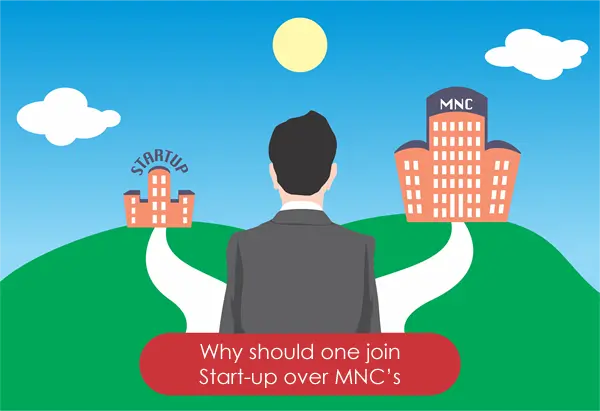
The facts as depicted in the following graph are self-explanatory. MNC or a Multinational Corporation has certain advantages over the startups, which has made 58% of students opt for it over the startup culture! While this hasn‘t hurt the growth, with the world boasting almost 26,000 startups in the fintech sector alone as of 2021, according to Statista.

We decided to evaluate how your professional life can be changed by choosing the proper company for yourself and what indications you need to observe before choosing a startup or MNC. In this blog, we are going to discuss seven significant differences between MNC and startup workplaces, and clarify the distinction between MNC and startup workplace cultures.
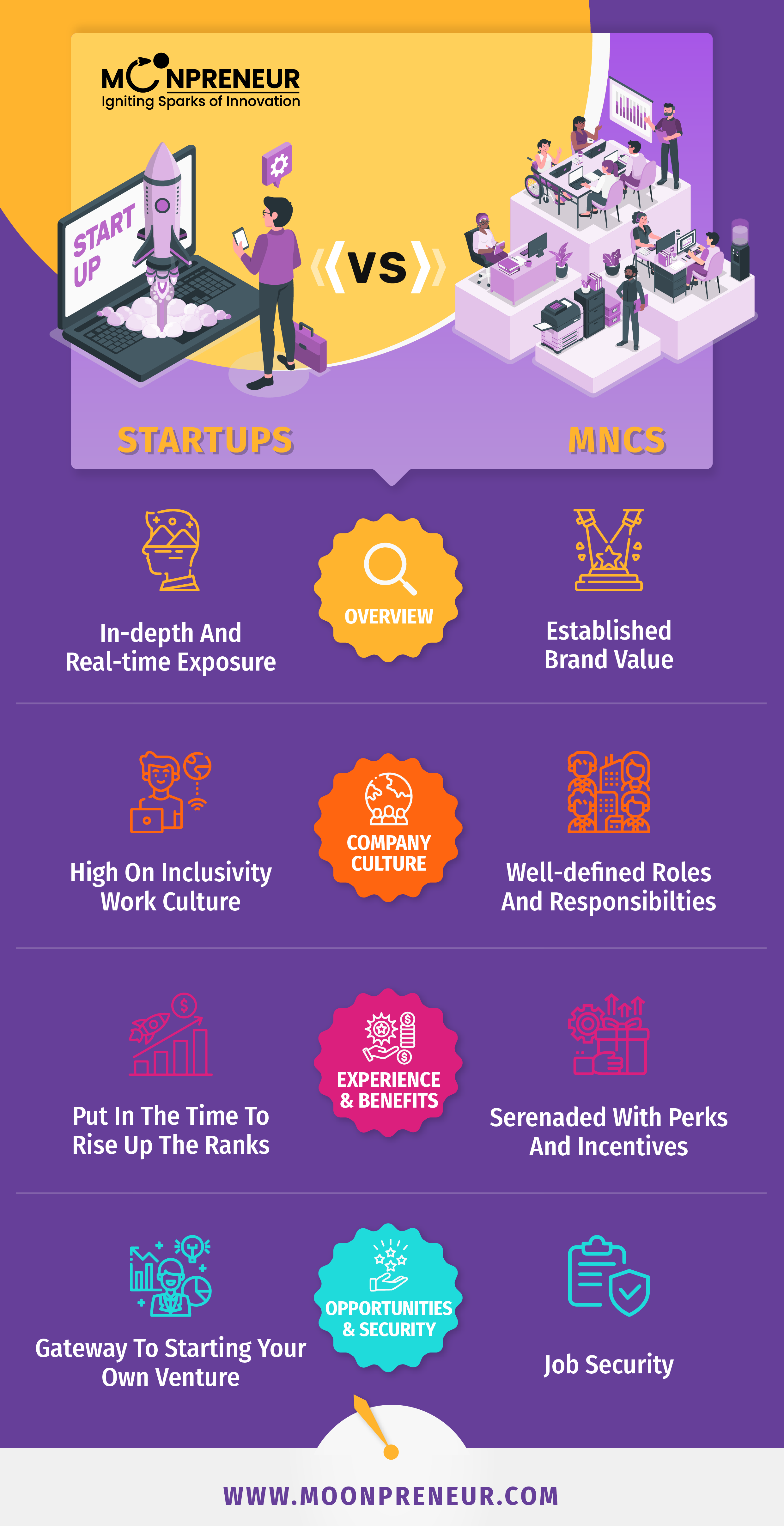
1. Company Size and Structure
One of the most obvious distinctions between MNCs and startups is their size and organization. Some of the largest MNCs, including Amazon and Apple, are based in the US, and they are gigantic if numbers, as indicated in the graph below, are taken into account. Such companies are typically large and established MNC firms with clearly defined hierarchical organizations. Conversely, startups usually involve working in a smaller and more dynamic team with a comparatively flat structure.
The contrast between MNC and startup is not just about size but also about how they approach innovation, expansion, and the role of employees. This usually creates a dilemma: startup or MNC, which is more beneficial for one’s professional development? Whereas MNC vs startup comparisons bring to the fore stability vs agility, the decision rests on personal inclinations and career aspirations. Also, startup multinacional is a term used for startups with an international presence, so the MNC vs corporate or MNC vs startup debate becomes even more complex.
Recommended Reading: Child Entrepreneurship: Top 7 Tips to Support Your Kid
| MNC | Startup |
|---|---|
| In MNCs, there is a clear division of labor and well-defined job roles. Employees work in a structured environment and have clear responsibilities with specific KPIs to achieve. | Startups operate in a more flexible and dynamic work environment, focusing on collaboration and cross-functional roles. Startups offer the opportunity to wear multiple hats and work on projects outside of your area of expertise, allowing employees to develop a broader skill set. |
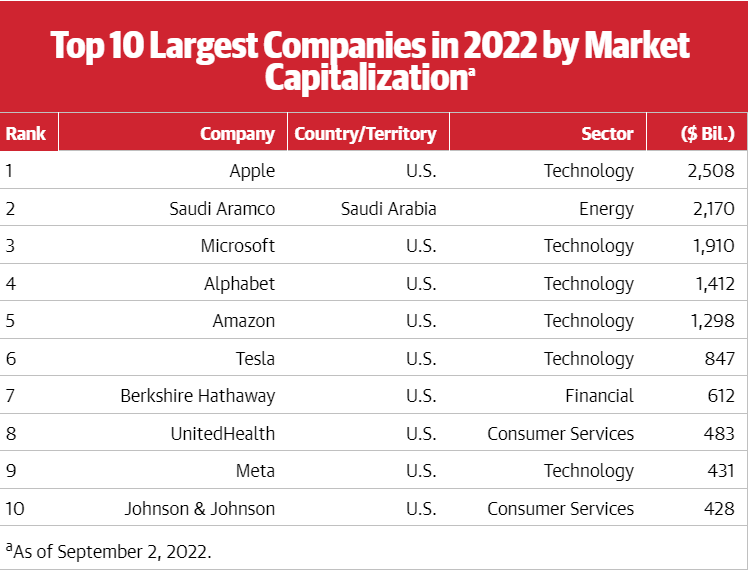
2. Work Culture
Another important distinction between startups and MNCs is their work environment and culture. Working for a startup tends to be a dynamic and fast-paced environment, where one may have to play multiple roles and responsibilities. An MNC company, on the other hand, provides a more formalized and hierarchical work environment, with set processes and clear-cut career paths. This is an important factor to consider when choosing startup vs MNC career opportunities. Whether you opt for a startup or MNC, your choice would be based on your career ambitions and interests. The argument about MNC vs startup usually discusses the flexibility and creativity of startups against the security and international exposure offered by MNCs. Moreover, the people who consider MNC vs corporate culture may discover startup multinational companies combining the best of both worlds. Grasping the distinction between MNC and startup is crucial in deciding upon a career.
Recommended Reading: Identifying the Suitable Employee for Your Startup
| MNC | Startup |
|---|---|
| MNCs are known for their formal and corporate culture, with well-established processes, policies, and procedures. | In contrast, startups have a more relaxed and informal culture, focusing on innovation, experimentation, and creativity. Startups also often have more open communication channels, with founders and executives being more approachable and accessible to employees. MNCs, on the other hand, are more formal in their communication and have a more rigid work environment. |
3. Employment Security and Stability
According to Randstad‘s report, almost 52% of employees are ready to sacrifice more than 10% of their wages in order to get job security! Stability and job security are the top aspects one keeps in mind when weighing whether to work for an MNC or startup. Startups bring innovation and growth at high speed, while MNC businesses guarantee stability and long-term advantage. This startup-MNC dilemma is one that faces many professionals when they consider weighing the advantages and disadvantages of either. The divide between MNC and startup quite often hinges on risk appetite as well as personal career aspirations. Regardless of what one decides in terms of startup or MNC, it becomes a matter of personal choice. Surprisingly enough, the penchant for job security is something that remains consistent whether it is MNCs, startups, or even the overall corporate sector.
| MNC | Startup |
|---|---|
| MNCs are commonly considered to be more stable and secure, with well-established business models and steady revenue streams. Over the years, MNCs have built a larger customer base, which means that they are less vulnerable to market fluctuations. | Startups are generally considered to be less stable and riskier. Startups are often funded by venture capital firms, meaning they have to demonstrate rapid growth and profitability to attract further investment. |
Therefore, startups are more susceptible to economic downturns and market fluctuations. Startups also tend to have a greater chance of failure, and you, as an employee, stand a better chance of being laid off if the business does not perform well.
4. Career Development and Learning Opportunities
Special career growth and learning opportunities are provided both by MNCs and startups. While startup vs MNC, one should take into consideration the various environments they offer. Startup work entails doing many jobs at once, which promotes instant learning and adjustment. In contrast, an MNC firm offers a formal structure with well-delineated positions, providing stability and access to worldwide resources. Choosing between MNC or startup is up to your professional goals—whether you value innovation and hands-on exposure or the perception and advantages that come with MNCs. What sets MNC apart from startups is size, culture, and opportunities for growth. For those considering MNC vs corporate or even startup multinacional, the fundamental dynamics of each must be known to make an educated decision. Whether it is being employed in a startup or finding one’s place in the worldwide framework of MNCs, both routes can offer rewarding careers suited to varying ambitions.
| MNC | Startup |
|---|---|
| Although MNCs often have well-defined career paths and structured training programs that allow employees to develop their skills and progress within the organization. Working in an MNC also allows you to work on large-scale projects and initiatives, which can be a valuable learning experience. | Startups, on the other hand, offer more opportunities to learn and develop skills outside of your job role. In a startup, employees are often required to wear multiple hats and work on projects outside their expertise. Startups also offer the opportunity to work in a fast-paced and dynamic environment, which can help employees develop a sense of urgency and adaptability. |
This can provide valuable learning opportunities and help employees develop a broader skill set.
6. Work-Life Balance
Whether an MNC or a startup, work-life balance is something of consideration for most employees; almost 77% of the employees have asserted that they have been burnout at least once during their employment. Also, about 72% are of the view that work-life balance is very significant when considering a job. Surprisingly, employment with a startup may be more flexible, whereas an MNC organization tends to provide organized workspaces, which can affect work-life balance in various ways. Furthermore, 57% of the job seekers indicate that a company having a poor work-life balance is an absolute no for them!
In the case of the MNC vs startup debate, most professionals consider aspects such as stability, career development, and flexibility. Though startups are dynamic and high–speed, MNCs offer international exposure and stability. MNC and startup differ in terms of size, culture, and structure, which can go a long way in influencing work-life balance. It is essential for job hunters analyzing MNC vs corporate or debating a startup multinational to keep these facts in mind in choosing the ideal career path.
And here comes the surprising difference between MNCs and startups.
| MNC | Startup |
|---|---|
| MNCs often offer more competitive salaries and benefits, such as healthcare, retirement plans, and paid time off, to their employees, and also often offer bonuses and profit-sharing plans, which can be a valuable source of additional income for the employees. | Startups, on the other hand, offer more opportunities to learn and develop skills outside of your job role. In a startup, employees are often required to wear multiple hats and work on projects outside their expertise. Startups also offer the opportunity to work in a fast-paced and dynamic environment, which can help employees develop a sense of urgency and adaptability. |
7. Innovation and Creativity
Startups drive innovation in a nation; the most significant benefit of employment in a startup is the chance to work in an innovative, dynamic, and thrilling work culture. Startups tend to be engaged in creating new products and services, which demands a high level of creativity and innovation. may be more concerned with preserving the status quo and refining current products and services.
There are nearly 71,153 startups in the United States alone, while India ranks second at 13,125 startups, which is boosting its emerging economy! As seen from the graph below by Statista, what differentiates MNC from a startup is in the focus areas, as the latter works much more on technology areas of innovation. Therefore, being employed by a startup can be a wonderful career option for those who like to work on bleeding-edge technology and experiment with new concepts.
If you are stuck with choosing between startup and MNC, think about whether you are more comfortable working for a startup in an accelerated atmosphere or for a stable MNC firm focusing on optimization. The MNC vs startup debate usually comes down to personal preference, career aspirations, and risk comfort levels. Although mncs might have more defined career progression, startups offer an opportunity to innovate and rapidly increase, making them suitable for individuals who love new concepts.
| MNC | Startup |
|---|---|
| MNCs often have more structured work hours. | In contrast, the fast-paced and dynamic nature of startups can lead to longer work hours and a higher stress level for some employees. |
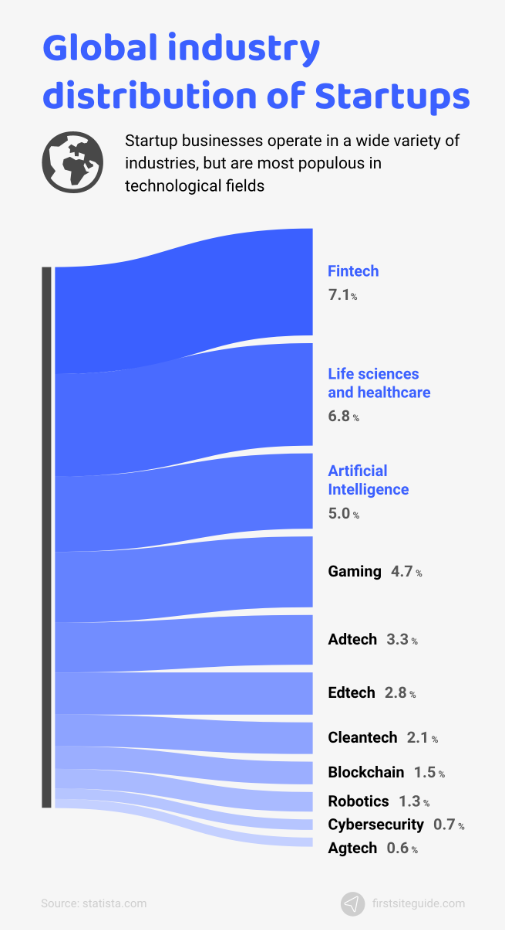
Pros and Cons of MNC’s
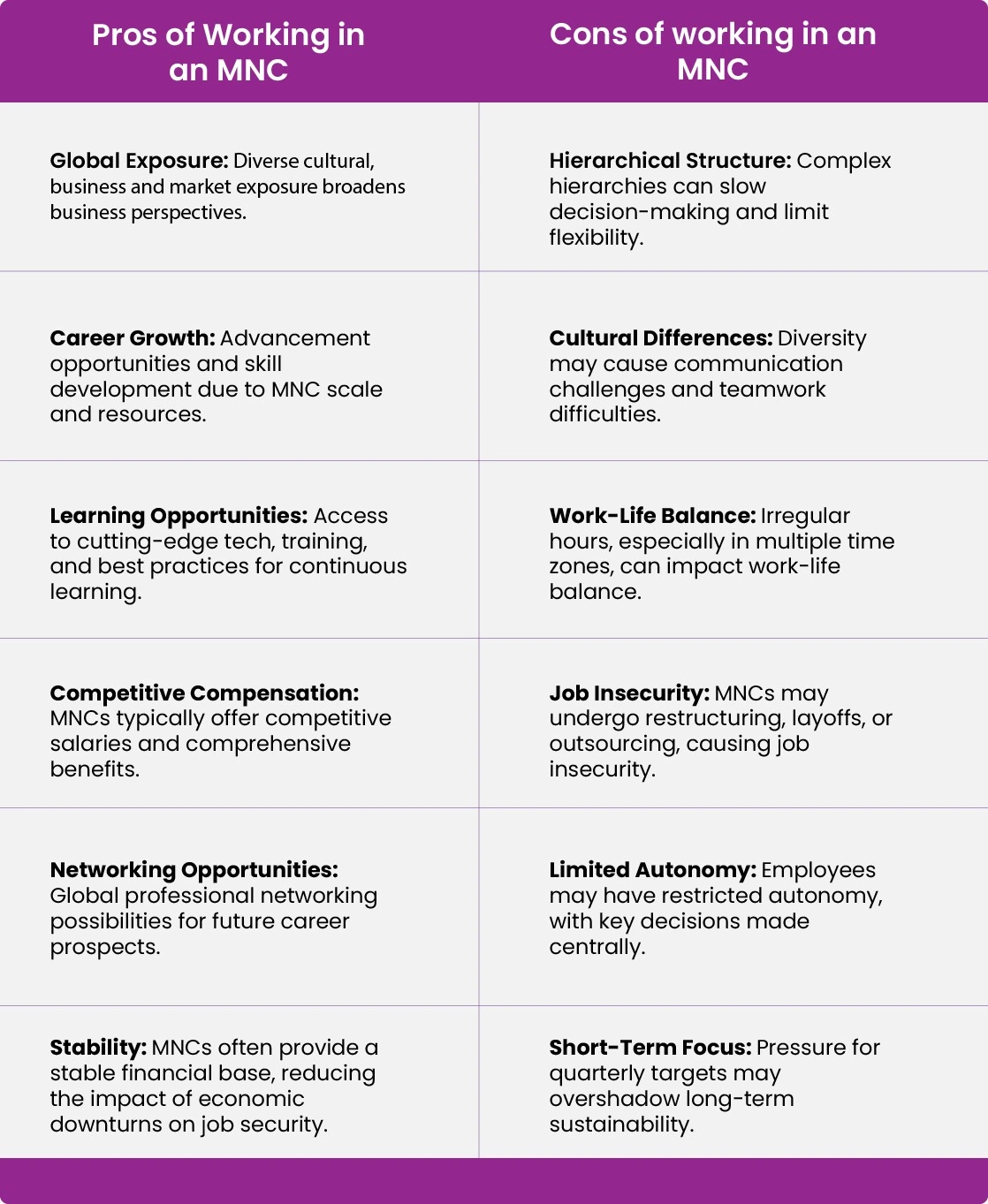
Pros and Cons of Startups
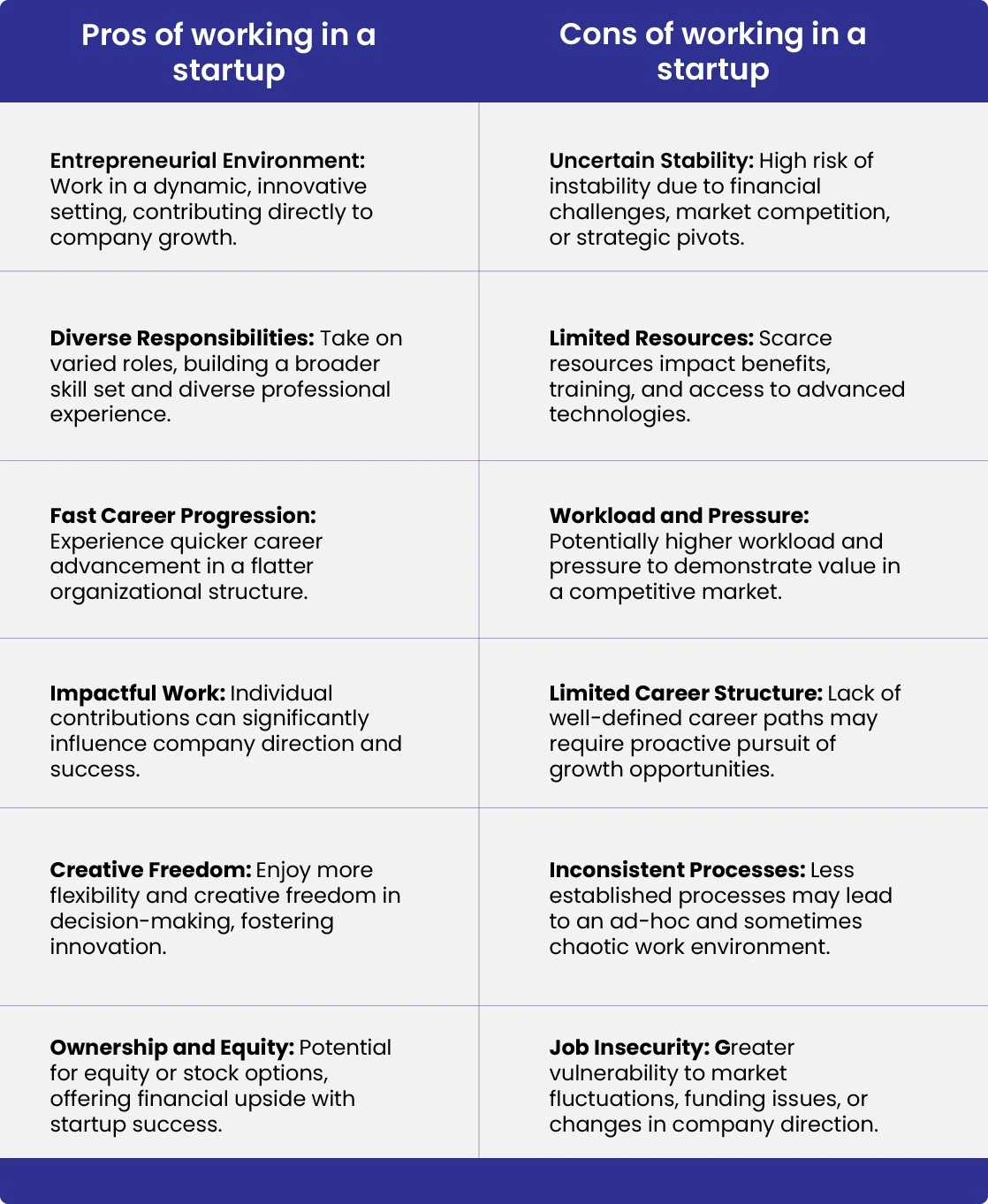
Recommended Reading: Identifying the Suitable Employee for Your Startup
Conclusion
There are wide variations while opting between startup vs MNC, and making the choice of what path to pursue can be daunting. The benefits of an MNC firm tend to provide a better chance for an individual in terms of salary, like job security, formal processes, and more benefits. Yet, being employed in a startup offers a rapidly changing learning atmosphere that could be worth it for many individuals, particularly those wanting to acquire firsthand experience and a lively working environment. The startup vs MNC debate continues to fuel conversations, as both present different experiences and opportunities for growth. Startup vs MNC will be determined mainly by a person’s individual goals, professional ambitions, and tolerance for risk. While MNCs bring stability and a well-defined career progression, startups, such as startup multinacional, can provide the excitement of innovation and quicker career advancement. Finally, knowing the distinction between MNC and startup assists in making a more rational choice according to one‘s priorities in life. At the end of the day, MNC vs startup isn’t about one being “better” than the other — it’s about your goals, learning style, and what matters most in your career.
Moonpreneur aims to revolutionize conventional education and future-proof the next generation through integrated learning solutions. Its Innovator Program is shaping tomorrow‘s workforce by equipping students with AI/ML, Robotics, Coding, IoT, and Apps training, empowering entrepreneurship through experiential learning.
| MNC | Startup |
|---|---|
| MNCs often have more structured work hours. | In contrast, the fast-paced and dynamic nature of startups can lead to longer work hours and a higher stress level for some employees. |



























You have missed risk tolerance factor which is needed to be considered for choosing between an MNC and a startup
Which is better for me, working for an MNC or a startup?
The best place to work for you depends on your individual preferences and goals. If you are looking for job security and stability, an MNC may be a better choice. If you are looking for an exciting and challenging environment, a startup may be a better fit.
Ultimately, the best way to decide which type of company is right for you is to do your research and talk to people who work in both types of environments.